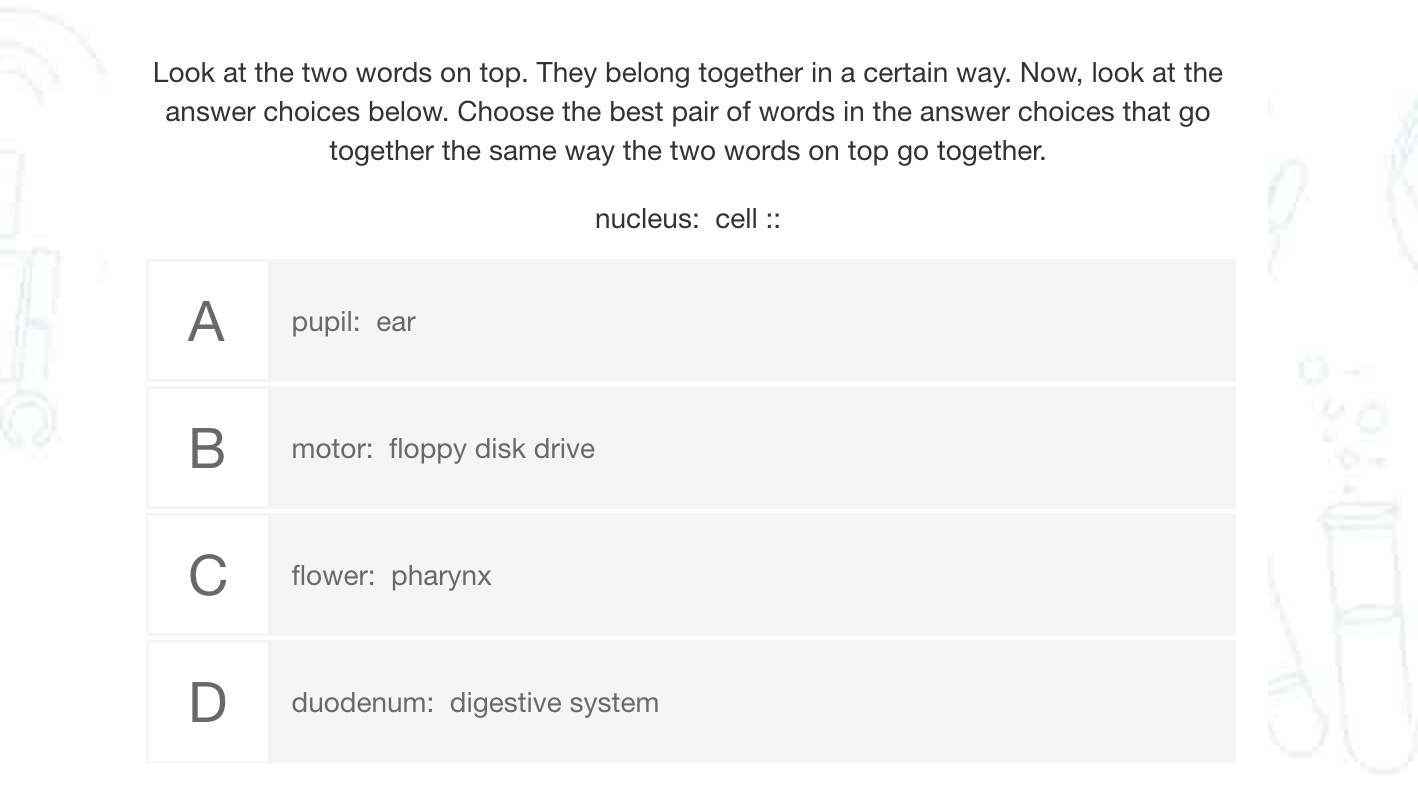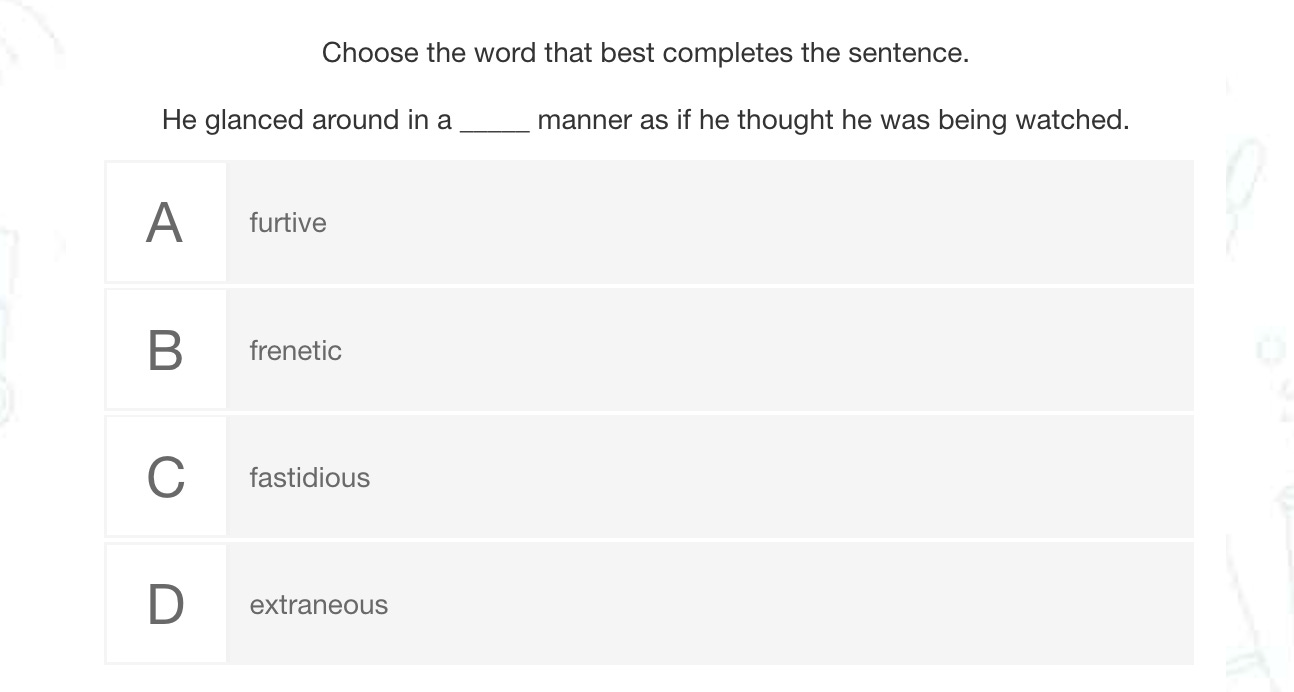There’s this fun thing you can do in science fiction and fantasy where you take basically any trait and make it the defining feature of humanity. I was linked to a post recently praising the way “humans” are universally referred to as “tallfolk” in a certain fantasy setting. It’s a very economical bit of world-building. From that one word choice, the reader infers that there are many intelligent humanoid species, most or all of whom are smaller on average than humans. The reader can also infer that humans aren’t culturally dominant, or else they’d be called Men and the other races Little Folk, as in Lord of the Rings.
Again, you can do this with anything.
“Humans? Oh, right, they’re those aliens who are always using experimental technology.”
“Humans possess an uncanny ability known as ‘seeing,’ which forms the foundation of their languages and philosophies.”
“Humans are known as Greenwalkers, for they possess the eldritch ability to see any number of green things in a day without spontaneously turning into a wolf.”
This gets less fun when people do it to you from inside your own universe.
Dissenting Academies
“Dissenting Academies” are schools that accept non-Anglican students and faculty. That’s the entirety of the definition. It’s a school you don’t have to be a member of the Church of England to go to or to teach at. They accept Anglicans, just not exclusively. The term includes secondary schools, colleges, and seminaries.
Unlike unschaaling, I’m not making this one up. There’s a Wikipedia article and everything. Interestingly, the article currently begins “The dissenting academies were…” The past tense is problematic, because it falsely implies that they no longer exist, and we live under some kind of worldwide dystopian Anglican rule where the only two options are cake or death. But the present tense is problematic too, since it falsely implies that people still use the term outside of history books. “New York City is slated to open nine new dissenting academies across the Bronx, Brooklyn, and Queens, New York City Public Schools announced Thursday,” reported nobody last April. “Including a magnet dissenting academy for students interested in a career in film,” no newspaper continued.
In 17th and 18th-century England, however, dissenting academies were rarer, and the term was used often. Usually, unfavorably. The most famous attack on them came in a sermon delivered on November 5th, 1709. This was the anniversary, of course, of that time a bunch of non-Anglicans tried to blow up Parliament. We usually say “Catholics,” but that term didn’t work well for sermonizing against the academies, who also accepted non-Catholics. The sermon is nigh-unreadable (and this is me saying that), but Google Books does turn up some less aggressively capitalized examples, of which my favorite is a satirical letter purporting to be written by “Timothy Newlight,” an alum of one such academy. (I started reading it in the middle, at the first usage of my search term, and then was delighted to scroll up and discover that it’s mainly meant as an attack on William Godwin.) Little Timothy never had a chance to learn why not to follow Godwin, because of the dangerous trends his mother was into.
When I was old enough to be sent to school, my mother was at pains to find a master of the right sort. One advantage of the New Light, as you must have observed in the writings of many of its professors, is that you may get at it without any learning or ability. These were therefore not necessary in the choice of a preceptor; and to find a schoolmaster without powers or knowledge is a very easy matter, especially in Dissenting Academies. I was accordingly committed to the care of Mr Thickhead…
Under Mr. Thickhead I did not learn much of Latin or Greek, for a very plain reason, that he knew very little of either himself. But to make up for that, I profited so well by his precept and example that I became a complete Deist and Republican.
(This last bit is a slander on Godwin, who did indeed say that the only standardized education should be the absolute basics, but who included Latin and Greek in his definition of “the absolute basics.” But it’s true that, to this day, many dissenting academies teach very little of these languages.)
Markedness
Linguists call this whole business “markedness.” The term’s become popular in sociology too. If you divide the world into people and tallfolk, tallness is marked and normal height is unmarked. Sometimes, as in the case of non-dissenting academies, there’s no term for the unmarked. Sometimes there is, but it’s just seen as more neutral. “Old” is unmarked in the question “How old are you?” There’s no connotation of elderliness. If you instead asked “How young are you?” there is a connotation of youthfulness. Old is unmarked in this context because of how English speakers, culturally, tend to think about time. Almost always, markedness is expressing some kind of norm.
Rebels against that norm often rebel against marking conventions, too. Feminists avoid using male as unmarked, as in “she’s a congressman” or sometimes “you guys.” Trans activists and allies use the adjective cis a lot. (Although not nearly as often as we could. Biographies of Benjamin Franklin rarely mention that historians believe he was cisgendered.)
This is subtly important. Imagine what it would be like to live in 18th-century England. You’d hear so many horror stories about dissenting academies. Teachers abusing students. Teachers with wacky philosophies, like real-life Timothy Jollie who was rumored to disapprove of teaching math as it disagreed with Calvinism. Boys who went to dissenting academies and then got girls pregnant out of wedlock, as Timothy Newlight goes on to do. Students who dropped out, saying they weren’t being taught anything important.
You wouldn’t hear any of that about Anglican-only schools. Oh, you’d hear about evil teachers, but nobody would bother mentioning that they were Anglican teachers in non-dissenting academies. You’d hear about dropouts, and graduates having sex before marriage, but nobody would bother mentioning that their school was Anglicans-only. It’s unmarked. It’s implied. It’s irrelevant.
So, you’d think twice about sending your little Timothy to a Dissenting Academy, after everything you’d heard about them. Whereas you haven’t heard anything about the alternative. Nothing is about the unmarked option.
The marked option is also more socially risky. If you send Timmy to the school, or lack thereof, expected of your social class, and then Timmy grows up to be a serial killer (or a Deist, or a Republican), people might speculate that you’re partly to blame, as his mother. But if you send Timmy to a Dissenting Academy, and he grows up to be a murderer who doesn’t believe in kings and miracles, they’ll definitely blame you, because you made a choice. (And they’ll blame his deism for his murderousness, because “person who believes in miracles” is so unmarked there isn’t even a word for it).
It took over two hundred years for “not discriminating against Presbyterians” to be normalized for English schools. Long after people stopped being scared of Presbyterians, they were still scared of any school willing to admit them.
School Is Unmarked
(content warning for this section: sexual assault)
I know I’ve telegraphed this next pivot, but try to act surprised anyway. Today, school is the unmarked option. Not-school is the marked option. With dire consequences.
The child sexual assault problem in U.S. public schools is significantly worse, by most estimates, than in the Catholic Church. This study, one of many by Charol Shakeshaft, was published around the same time as the Boston Globe investigation into the church. It found, as these studies tend to do, that about 10% of K-12 students are assaulted by adults (usually teachers) on school grounds. Schools are at least twice as dangerous as churches in this respect. The school system protects its abusers the same way the church does—teachers caught molesting their students are simply transferred to another district, often without any negative notes on their record.
The Globe won a Pulitzer Prize for its investigation, and a movie about it won Best Picture at the Oscars. Charol Shakeshaft, her Wikipedia bio tells us, once appeared on National Public Radio. After all, the Globe reported on systemic corruption in an institution. Shakeshaft merely reported on tens of millions of unrelated cases. Nothing is systemic in an unmarked system.
As Erik Hoel notes, there’s recently been a wave of editorials (Washington Post, Scientific American, ProPublica) saying that more children need to be legally forced to attend public schools, in part to protect them from abuse. (According to an earlier ProPublica study, states like Michigan that enforce their existing truancy laws using private contractors sometimes end up sending children to prison, which ProPublica doesn’t object to in either article.) None of the statistics collected on the subject suggest that children not in school are abused at home at a greater rate than those in school. But there are a slew of anecdotes about homeschooled children being abused, and zero anecdotes about schooled children being abused at home—again, not because that doesn’t happen, but because an anecdote about a schooled child being abused isn’t an anecdote about school.
Conversely, 0% of students who don’t go to school are abused in school. This is probably the motivation for a significant proportion of truants and legal homeschoolers—escaping ongoing abuse. But the editorial boards of our major newspapers unanimously agree that more of those students should be forced back into their nightmare, or to prison if they refuse. For their safety.
Who gets to be the control group?
Let’s go back to Dissenting Academies for a second. Here’s some more sarcasm from their pseudonymous critic Timothy Newlight:
Indeed I am convinced that the whole secret of the New Philosophy is simply this: Whatever has been established is bad; that not only no learning is necessary to apprehend so compendious a doctrine, but is very hurtful, as it fills the mind with prejudice. I think, therefore, that what, in the old language, is called a stupid and ignorant schoolmaster, is the best preparer of a youth for the philosophy of Godwin; and IN THAT VIEW private academies are extremely useful.
The clear implication being that these academies are teaching their students nothing of substance. After all, look at all the things in the standard curriculum they aren’t learning!
Of course, they were learning other things instead. Students weren’t always learning Latin and Greek, but they were learning French and German. They weren’t always learning Aristotle’s science, but they were learning the modern experimental method. Two notable graduates of Dissenting Academies (among many) were Joseph Priestley and his little brother Timmy, who discovered oxygen, invented soda, and replicated the AMAB Benjamin Franklin’s famous kite experiment.
Also, some dissenting academies admitted students who weren’t assigned male at birth, such as Margaret King. King, among many other achievements and contributions, translated quite a few German-language medical works into English, presumably while alums of more reputable institutions were translating Galen.
Clearly we have a controversy here! On the one side, we have editorials claiming that Dissenting Academies aren’t teaching anything. On the other, we have alumni who claim to know things. Now, what would have happened if you’d done a modern-style experimental controlled study to settle the issue?
Well, let’s look at some sample questions from one of the standard tests of the time, according to a 1773 article in the London Magazine about Cambridge:
Planete primarii retinentur in orbitis suis vi gravitatis & motu projectili.
Iridis primaria & secundariæ phænomena solvi possunt ex principiis opticis.
Rete statuit Lockius de qualitatibus corporum.
Each of these are statements of scientific principles. To pass, you need to win a debate, in Latin, about whether the principle is true or not. And no cheating by actually performing experiments, of course. I wonder what Lockius thought of this.
If you pass that gauntlet, you get to take a written exam in English…which is almost entirely math. According to the same article, “a very superficial knowledge in morality and metaphysics will suffice.”
If you gave students from different schools the same tests, in the normal style of the time, I’d sure hope the Dissenting Academies kids would lose. The game would be very heavily weighted against them. If the Cambridge kids couldn’t blow them out of the water, it would be a stunning indictment of Cambridge. A test given in Cambridge style, to Cambridge and non-Cambridge students, should properly be interpreted as an experiment on the effectiveness of Cambridge. Right?
Rolling Stone recently published an article on unschooling, in which EJ Dickson writes
A handful of studies have found that children who are unschooled consistently underperform on academic testing compared to their traditionally schooled or more structured homeschooled peers, though Gray notes that such kids tend to catch up in their reading skills in particular as they get older.
This is usually how these studies are reported. Let’s take a look at the methodology. They’re all either tiny sample sizes, self-selected, or both, so I don’t feel too confident in drawing any particular conclusions from them. Still, here’s a sample. 12 unschooled students were given the same scholastic achievement tests as 25 homeschooled students and 37 public school students. The paper doesn’t give any examples of questions asked. They’re just the obvious sorts of questions, I guess. But they say they used the Woodcock–Johnson Test of Achievement, so I signed up for an account at testingmom.com to get their “free sample questions for test prep.” Here are a few for 7th grade:

The first one thinks it’s a science question, but you can get it wrong by not knowing what a floppy disk drive is, by knowing that floppy disk drives usually contain motors, or by knowing that most cells don’t contain a nucleus. Or if you reason at all differently from how you’re expected to: “people can survive after surgery to remove their duodenum, so digestive systems must be viable without them, but eukaryotic cells aren’t viable without the nucleus. On the other hand, if you removed the motor from a motorized disk drive…”
Other questions test your knowledge of midwestern city nicknames, midwestern agriculture, and the rules of tic-tac-toe. The English comprehension question is just a straight test of how conventional a thinker you are, in addition to knowing what the words mean. I’m pretty sure the intended answer is “furtive,” but I can’t easily articulate why. I’m drawing on decades of cultural osmosis and test-taking experience here. The intended answer is objectively worse. “Furtive” implies that he thinks he’s being watched, so the second half of the sentence is redundant. “Frenetic” or “fastidious” looking around could be motivated by any number of different things, including thinking you’re being watched, so they fit better with the full sentence.
The last one obviously thinks it’s a math question. But since the answers use a different labeling scheme than the pictured axes, it’s actually testing whether you learned math from a standard textbook, where the vertical line was always labeled “y” and the horizontal one “x”.
I assert that schooled kids should do far better on these tests. The tests are steeped, mostly unconsciously, in the assumption of standardized education. They’re also much easier to answer if you’re practiced at taking lots of standardized tests. Schooled kids have spent years of their lives preparing for them while unschooled kids were learning whatever they felt like. If school has any value at all, schooled kids should own these tests.
They, um, don’t. Our twelve unschooled kids perform on average one “grade level” worse than public school kids, suggesting that n years of dedicated schooling is about the equivalent of n+1 years of just doing whatever—in terms of the standard curriculum! Unschooled kids have also learned more things that don’t get taught in school.
Publications like Rolling Stone report on this study, and the few ones like it, as though it’s a bad result for unschooling. But if you treat it as a study about schooling, with the unschooled students as the control group, as Scott Alexander does here, it’s a truly terrible result for schooling. Duplex negatio affirmat. Too bad nothing is ever about schooling.
(Anyway, the studies are tiny and have nothing to do with actual life outcomes. So we shouldn’t really care about this except as an illustration of how warped our thinking has gotten.)
In Conclusion: Against Dissenting Academies
I guess I’ve become a strange bedfellow with these conservative Anglicans of the past. Dissenting academies, i.e. every school I know of that isn’t an Anglican seminary, have never been scientifically shown to be at all helpful in today’s society. Many of their students, now as then, grow up to be Republicans. Dissenting academies are a danger to our children, and our insistence on sending everyone to them reduces our diversity of thought and knowledge. Society will be better off if it contains both kinds of people: the kind that picks “duodenum” and the kind that picks “motor.” Resist the calls for restrictions on homeschooling. Let individuals decide which answer is right for them.










Another wonderful one, and a great reminder to look out for all the unmarked things. The water we swim in, in the old joke…
I mark this as liked.